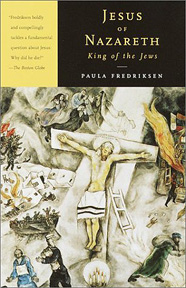Multimedia • Reference • Religion • Travel |
 Jesus of Nazareth, King of the Jews : A Jewish Life and the Emergence of Christianity Paula Fredericksen
Description From The Publisher: Paula Fredriksen draws on the narratives of all four evangelists as well as both John and the Synoptics, the Dead Sea Scrolls, Jewish authorities of Jesus' time - Philo, Paul, and Josephus - who wrote in Greek, and early rabbinic writings. She shows us a historical Jesus living in the tumultuous world of late-Second Temple Judaism: an observant Jew of his time, a prophetic teacher who traveled through the villages of Galilee and frequently in and around Jerusalem. "At the center of her book she brings us to the questions raised by the least disputed fact about Jesus' life: his death.. "Why was crucifixion chosen as the means of execution? If Jesus was executed as a political insurrectionist, why were none of his followers executed or even arrested?" The author's quest in search of the answers takes us through the religious world—Jewish and pagan—of Mediterranean antiquity, through the tangle of Judean and Galilean politics, and through the surprisingly intimate social interactions of Jewish and gentile communities in the ancient city. And it is through the Gospel of John—a text out of favor in most academic reconstructions - that she finds the answer to the interpretive dilemma posed by Jesus' execution and his disciples' survival. Reviews These two books offer an enormous contrast. While Fredriksen provides a balanced, carefully reasoned, scholarly study of the historical Jesus, Ellegard's conclusions can only be described as preposterous. Ellegard (formerly dean, Univ. of G teburg, Sweden) is clearly familiar with some mainline biblical scholarship, but he always opts for the minority view and stretches it beyond reason. For example, he believes that the Gospels were written in the second century C.E. and traces the origin of Christianity to "a group of pious Jews called the Essenes" (the Dead Sea Scrolls group). Then, based on this highly questionable and twisted "evidence," he leaps to several unjustified conclusions: that Jesus lived long before he was supposed to have and that his disciples had only "ecstatic visions" of him and never knew him in the flesh. The Gospel writers, he suggests, then mistook their visions for real events and created fictitious accounts of Jesus' life. Fredriksen (scripture, Boston Univ.), on the other hand, explores the conundrum of a well-established historical fact--namely, that Jesus was executed by the Roman prefect Pilate as a political insurrectionist while his followers were not. She concludes that it was the volatile mix of excited pilgrims in Jerusalem for Passover and their acclaim of Jesus at a time when Pilate was especially interested in keeping the peace that led to his death. Her balanced, well-written work could serve as a kind of introduction to the content and methodology scholars use in the study of the historical Jesus and is highly recommended for any library. Ellegard's work would only be useful as an example of the false conclusions that result when questionable opinion is stretched beyond reasonable limits. —Library Journal, David Bourquin, California State Univ., San Bernardino Copyright 1999 Cahners Business Information. Among bookstore shelves crowded with recent biographies of Jesus of Nazareth, Fredriksen's contribution will certainly be a welcome addition. It is scholarly without being pedantic, insightful without being revolutionary. Yet the central question it asks--"Why did Jesus die the way he did?"--strikes to the very core of the debate over the Historical Jesus. Fredriksen, Aurelio Professor of Scripture at Boston University, brings to this question enormous erudition drawn from the rabbinic writings, opening fresh ways of looking at the well-trodden Historical Jesus material. Her careful working through the serious historical issues surrounding the definition of "Gospel Truth," the nature of God and Israel in Roman antiquity--as well as the problem of Paul's renovation of the first Christians' view of Jesus--are important contributions to our understanding of Jesus' life. Unlike some other new biographies of Jesus emerging from the trade press, the scholarly apparatus for this text was not shed in the hopes of making it more acceptable to the general reader. The author's notes, far from merely documenting sources, contain interesting and useful augmentations. There is much new here, something that seems unusual for territory so heavily mined. Fredriksen's Jesus of Nazareth is one of those enviable scholarly works that is both a credible scholarly effort and a very good read. (Nov.) Copyright 1999 Cahners Business Information. —Publisher's Weekly
Reader's Index Send us your favorite quotes or passages from this book. About the Author Paula Fredriksen studied ancient Christianity at Wellesley College, Oxford University, and Princeton University. She has taught at Stanford, Berkeley, and the Hebrew University in Jerusalem, and is currently the Aurelio Professor of Scripture at Boston University. She is the author of two previous books and of various studies on Paul, Augustine, and conversion in late antiquity. Table of Contents
Customer Reviews Write your own online review. Look for Similar Books by Subject
| ||||||||||||||||||||||||||||||||||||||||||||||||||||||||||
Copyright ©1996-2010 CenturyOne Bookstore. All Rights Reserved. All prices subject to change and given in U.S. dollars. Your purchase from CenturyOne.com will assist the CenturyOne Foundation in providing funding for various archaeological and research projects which seek to provide more information about the period of the First Century C.E., the origins of Christianity and the world of the Bible in general. All materials contained in http://www.centuryone.com are protected by copyright and trademark laws and may not be used for any purpose whatsoever other than private, non-commercial viewing purposes. Derivative works and other unauthorized copying or use of stills, video footage, text or graphics is expressly prohibited. |

